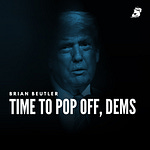Mitch Daniels: Raised Four Wonderful Daughters and Fixed the BMV
Sep 02, 2022
∙ Paid
The Bulwark Podcast
Audio
Video
Tim Miller and guests discuss the latest political news for the flagship podcast of the Never Trump movement and the reality-based community. Every weekday we provide insightful analysis, political hot-takes, an unabashed defense of liberal democracy and long-form interviews that cut through the "both-sides" BS. Plus a few laughs to help you wash down the crazy.
An ad-free edition is exclusively available for Bulwark+ members.
Tim Miller and guests discuss the latest political news for the flagship podcast of the Never Trump movement and the reality-based community. Every weekday we provide insightful analysis, political hot-takes, an unabashed defense of liberal democracy and long-form interviews that cut through the "both-sides" BS. Plus a few laughs to help you wash down the crazy.
An ad-free edition is exclusively available for Bulwark+ members.Listen on
Substack App
Apple Podcasts
Spotify
YouTube Music
YouTube
Overcast
Pocket Casts
RSS Feed
Recent Episodes














